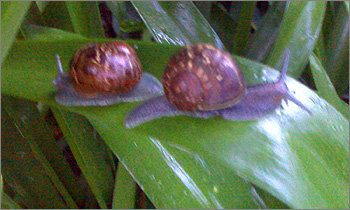My piece about Japanese whaling chief Hideki Moronuki is generating some interesting discussion. I’ve just posted a long comment. Worth a read, even if it’s not about Heath Ledger. Oh, and you can always subscribe to the comments feed to ensure you don’t miss any of the action.
Leaving room for elephants: a chat with David Attenborough

Last night’s final episode of Michael Parkinson‘s long-running TV chat show should have been much better, given the stellar cast. The one stand-out for me was David Attenborough. Something he said reminded me of a conversation we had 24 years ago. I’ll share that episode shortly. But first, here’s the interview we did…
Sir David Attenborough hardly needs an introduction. He was in Australia promoting the TV series and book The Living Planet when I spoke with him. His previous series Life on Earth was the UK’s highest-rating ever at that time. The Living Planet looked to be heading in the same direction.
Attenborough has been a TV producer almost as long as the medium has existed.
From 1965 to 1969 he was Controller of the then-new BBC 2, followed by four years in another executive position. After 8 years behind a desk he decided he’d had enough of computers, accounting and unions, and returned to life as a producer — a decision, he says, that wasn’t hard to make.
Continue reading “Leaving room for elephants: a chat with David Attenborough”And they still get a vote…
Global warming — no, I won’t cave into the Neo-Con’s re-branding of “climate change” — may be an important election issue. But, as with so many big issues, most voters wouldn’t have a clue.
Yesterday the Daily Telegraph asked people a multiple-choice question to see whether they knew what the Kyoto Protocol was. Nearly half got it right.
Respondents were asked to select a description of Kyoto from a set of multiple options: (a) A Korean car, (b) The treaty that ended WWII, (c) An agreement on carbon emissions and (d) A Japanese banquet dish.
Almost half of the people surveyed answered correctly… But close to half of those who answered correctly admitted guessing the response.
38% thought it was the treaty ending WWII.
I shouldn’t be surprised. Back when I was working for ABC Radio I did a vox pop the morning after a state cabinet re-shuffle, asking people to name any cabinet member, old or new. 80% didn’t know what a “cabinet” was, let alone any names.
Global Warming: analysing the risk
Yesterday Crikey reminded me about this video. I’d seen it before, but it’s worth seeing it again — particularly during the election campaign — and showing it to as many people as possible.
The message is simple. Perhaps we can never be 100% sure that global warming is primarily caused by human activity. However the risk of this being the case and us doing nothing about it far outweighs the risk of changing our behaviour and then finding out it wasn’t necessary.
Bisexual snail orgy

I was shocked. Early this morning every single agapanthus plant in our back yard was covered in snails. They’d climbed up onto the leaves — and they were having sex.
Hundreds and hundreds of snails engaged in a filthy hermaphroditic bisexual snail orgy!
I raced inside to get a camera. I couldn’t find The Good Camera quickly enough, so I grabbed my phone.
But the forecast is for a 34C maximum today — in October! The sun was rising, and so was the temperature. The snails were retreating.
I only had time to grab a quick, blurry image of this pair (pictured), going their separate ways after a morning of debauchery. Sluts.
Word of the Moment: Greenwashing
I’ll just quote the source:
The term greenwashing applies when companies (or governments) spend more money or time advertising being green, than on investing in environmentally sound practices.
In business, greenwashing often means changing the name and/or label. Early warning signs that a product is probably toxic include images of trees, birds, or dew drops. If all three are on the box, the product will probably make your skin peel off in seconds…
Thanks to John Thackara at Doors of Perception, and to One Plus One Equals Three for the pointer.

